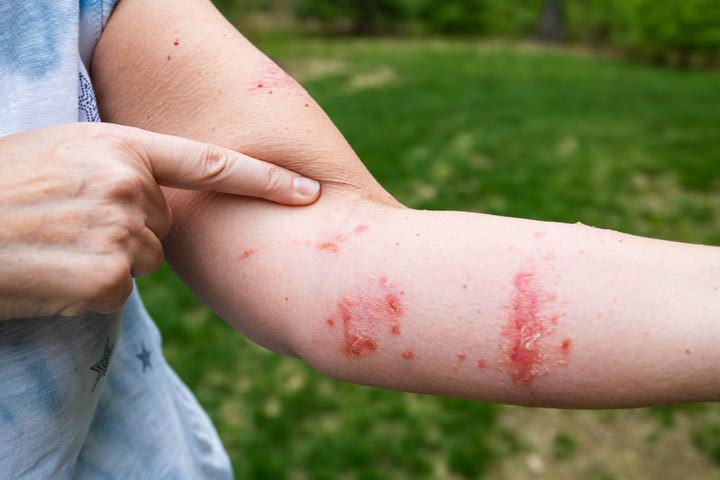Poison ivy rash is caused by a flowering plant that is mostly found in North America and some provinces of Canada. This plant secretes a sticky sap that causes itchy, painful rashes if it comes in contact with human skin. The sticky sap is a type of oil called urushiol which causes allergic contact dermatitis. Urushiol binds to the skin on contact and leads to inflammation of the skin. It results in blistering and severe itching. Washing the area of contact could save us from complications otherwise the itching could last up to several weeks. Topical application of calamine lotion, OTC drugs, oatmeal baths, etc is found to give relief in mild cases. However, in severe cases where the poison ivy rashes spread to the face and genitals, medical intervention is necessary.
Symptoms of poison ivy rash
Symptoms of poison ivy rash comprise redness, colorless bumps, blisters, and severe itching. Furthermore, inhaling the smoke of burning poison ivy plant might cause severe breathing difficulties needing immediate medical care.
Causes of poison ivy rash
Poison ivy rash is an allergic reaction towards the sap urushiol that oozes from the plant. The plant resin urushiol is sticky in nature and sticks to anything that comes into its contact. Coming into direct contact with the plant resin or touching clothes and tools that might contain the sap of the plant are possible means of transmission. The rashes might develop within 12 hours of exposure and develop fully in few more days. However, the symptoms last for many weeks together.
How contagious is poison ivy rash?
The good news is that these rashes are not contagious. They cannot spread from the pus that comes out of the blisters. The rash occurs only when the plant oil touches the skin either directly or from other possible carriers. The brushing of human skin against the plant resin directly causes the spreading of the rashes. Apart from that touching tools, animal fur, or clothes that might have been exposed to the oil urushiol can also cause the rashes to spread. It might appear to be contagious if the rashes are spreading over time. But that happens due to the different rate at which the plant oil is absorbed by the skin at different places. Or it can spread due to repeated exposure to contaminated articles. Human-to-human transmission does not happen in the case of poison ivy rash.
How to prevent poison ivy rash?
It is always better to be watchful and take preventive measures when you might be living or working around poison ivy plants. Let us have a look at a few preventive tips.
- Educate yourself about the plant and its effects on human skin when exposed to it. Google search to read the articles regarding its dangers. Before that search for images of the plant on the internet so that you could be cautious against it.
- Once you know that you might be working around the plants, wash all your equipment, tools, and clothes that might have possibly come into contact with the poison ivy plant.
- If you have pets wash and bathe them regularly with a pet shampoo preferably to do away with the plant resin in case they might have been exposed.
- If you suspect exposure to poison ivy wash your skin with soap and water immediately.
- Wear clothes that fully cover your body when around these plants.
Treatment for poison ivy rashes
Milder rashes disappear within few weeks without any treatment. However, certain things can be done to relieve the symptoms.
- Taking OTC prescription medication like corticosteroids both oral and topical can lighten the symptoms.
- Applying calamine lotion or other skin protectants containing zinc or taking an oatmeal bath can soothe the itching and also help to dry the blisters.
When to seek medical care?
When symptoms are severe and cause a lot of discomforts it is best to get in touch with your doctor. Visit your doctor if you are facing any of the below-mentioned issues.
- The rashes are itching severely and spreading to your face and genitals.
- The pus out of your blister is turning yellow in color. This is an indication of bacterial infection.
- The rash does not seem to be improving with time.
- You find it difficult to breathe.
- Your sleep is highly disturbed due to severe, painful itching.
- You run fever above 100 degrees Fahrenheit.
Conclusion
Although poison ivy rash is not contagious from human to human, repeated exposure to the ivy sap can cause it to spread again and again. FDA says that the urushiol oil from the plant that causes the rash can be sticking to surfaces ever for years. It is advisable to wash using soap and water or rubbing alcohol. Avoid scratching the blisters as it might lead to bacterial infection causing further damage. Even though the symptoms are relieved over time without medical intervention, it is better to seek advice from your doctor for severe cases.
References:
https://www.health.harvard.edu/staying-healthy/is-poison-ivy-contagious
https://www.fda.gov/consumers/consumer-updates/outsmarting-poison-ivy-and-other-poisonous-plants
https://www.mayoclinic.org/diseases-conditions/poison-ivy/symptoms-causes/syc-20376485
https://www.aad.org/public/everyday-care/itchy-skin/poison-ivy/who-gets-contagious
